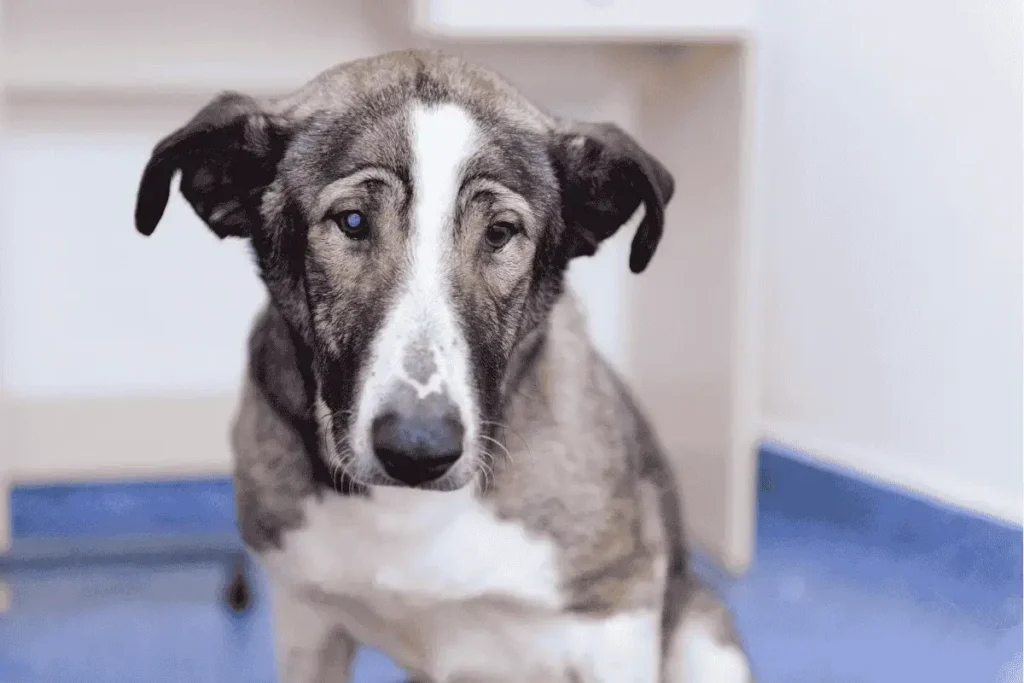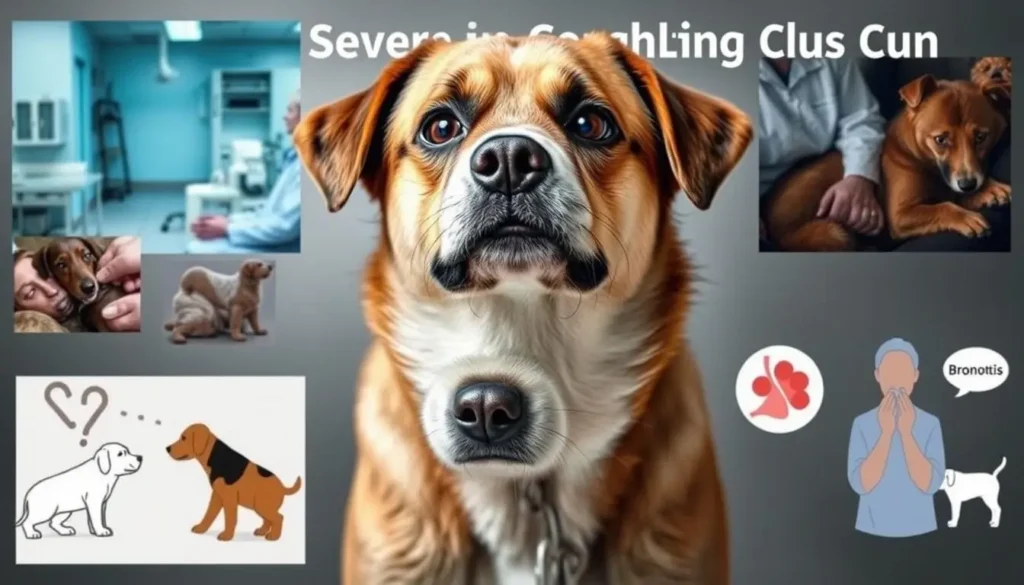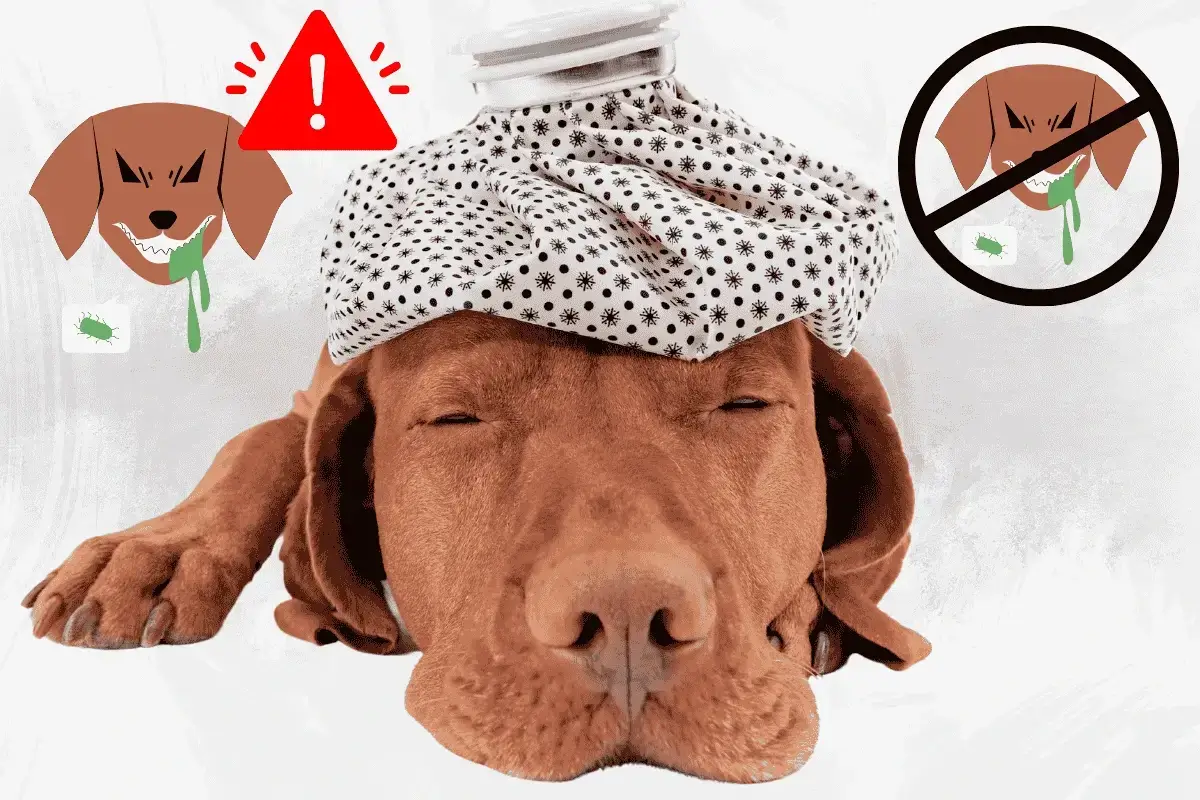Dog Coughing Up Phlegm? Causes, Symptoms, and When to Worry
Seeing your dog in distress is a worry for any pet owner. When your dog coughs up phlegm, it’s a concerning sight. But knowing the common causes and symptoms can ease your mind.
It helps ensure your dog gets the care they need. Understanding these can make a big difference.

Key Takeaways
- Coughing in dogs can indicate a range of health issues, from minor irritations to severe conditions.
- Observing the type of cough, accompanying symptoms and duration is crucial for proper diagnosis and treatment.
- Common causes of dog coughing up phlegm include respiratory infections, heart disease, and environmental factors like allergies.
- Persistent or severe coughing, difficulty breathing, and other concerning symptoms require immediate veterinary attention.
- Getting timely treatment and continuous care is key to tackling the root cause and keeping your dog healthy and happy.
Understanding Dog Coughs: Types and Characteristics
Dog coughs can vary a lot. Understanding whether your dog has a wet or dry cough can give you important insights into their health. It’s critical to spot normal and concerning cough patterns.
Wet vs. Dry Coughs in Dogs
Wet coughs in dogs often mean there’s phlegm or mucus. They sound moist or gurgling. Dry coughs, on the other hand, are harsh and don’t have fluid.
Normal vs. Concerning Cough Patterns
Occasional, brief coughs are ordinary in dogs. They might be from irritation or a short-term issue. But, if coughing is persistent, frequent, or severe, it’s a worry. It could mean there’s a serious health problem.
Signs of Respiratory Distress
If your dog has trouble breathing, blue gums or skin, or is very tired, it’s a sign of trouble. These symptoms, along with coughing, need vet help right away.
“Recognizing the different types and characteristics of dog coughs can help pet owners identify when their furry friend may need medical attention.”
Knowing about dog coughs helps you watch your pet’s health closely. If you notice anything odd, get vet help fast. This can really help your dog stay healthy.
Common Causes of Dog Coughing Up Phlegm
If your dog is coughing up phlegm, it could be due to a variety of reasons. Some common causes include respiratory infections, kennel cough, pneumonia, allergies, heart disease, and environmental irritants.
Bacteria like Bordetella and viruses cause kennel cough. It’s contagious and makes dogs cough in a distinctive “honking” sound. Dogs can catch kennel cough in crowded places like dog parks or daycares.
Pneumonia can also cause coughing, often with green or bloody mucus.
Allergies are another common reason for dog coughing. Environmental allergens can cause inflammation in a dog’s airways. This leads to coughing, sneezing, and itching.
| Condition | Symptoms | Causes |
|---|---|---|
| Kennel Cough | Honking cough, nasal discharge | Highly contagious, spread in crowded areas |
| Pneumonia | Coughing, green/bloody mucus, lethargy, fever | Bacterial or viral infections, lung inflammation |
| Allergies | Coughing, sneezing, itching, runny eyes/nose | Environmental allergens, seasonal triggers |
| Heart Disease | Coughing, difficulty breathing, fatigue | Mitral valve disease, dilated cardiomyopathy |
| Environmental Irritants | Coughing, sneezing, eye/nose irritation | Smoke, dust, chemicals, pollen |
Coughing can sometimes indicate heart disease or other serious health issues. It’s crucial to work with your vet to find the cause and get the proper treatment.
“Kennel cough is highly contagious and often spread in places where dogs congregate. Vaccinations are available as a preventive measure for dogs that socialize frequently.”
Respiratory Infections and Kennel Cough
Dogs can get respiratory infections from bacteria or viruses. Sometimes it’s both. Kennel cough is a common issue in dogs. It spreads quickly in places dogs like to be, like kennels and dog parks.
Bacterial Infections
Bacterial infections in dogs need antibiotics to get better. Bordetella bronchiseptica is a common cause of kennel cough. Your vet can prescribe antibiotics to help.
Viral Infections
Viral infections in dogs usually have to run their course. Parainfluenza and Adenovirus Type 2 are common causes of kennel cough. Antibiotics won’t work on these viruses, but your vet can help manage symptoms.
Treatment Options
Treating canine respiratory infections and kennel cough in dogs involves several steps:
- Rest and supportive care to help your dog’s body fight the infection
- Cough suppressants to alleviate the disruptive coughing
- Antibiotics, if a bacterial infection is present
- Making environmental adjustments, like using a humidifier to help your dog breathe more comfortably.
- Avoiding irritants that could worsen the symptoms
Most dogs with kennel cough or canine respiratory infections get better in a week or two. But, some dogs might face serious problems, especially young puppies, older dogs, or those with weak immune systems.
Heart Disease and Related Coughing Symptoms
Heart diseases like mitral valve endocarditis and dilated cardiomyopathy can cause dogs to cough a lot. These conditions often show up as coughing, especially at night or after exercise. Dogs may also feel tired and have trouble breathing.
About 10% of dogs have heart disease, and this number goes up to 35% for older dogs. Left-sided heart failure is the most common, while right-sided can cause fluid buildup in the body.
There’s no cure for heart failure in dogs, but early treatment can help a lot. Medications can improve heart function and reduce fluid buildup. Sometimes, surgery or a pacemaker is needed to fix the heart problems.
Recognizing the Signs of Cardiac Problems
Some common signs of canine heart disease and dog heart cough include:
- Frequent coughing, particularly during the night or following physical activity.
- Fatigue and reduced stamina
- Difficulty breathing, including rapid or difficult breathing
- Loss of appetite and weight loss
- Bluish-purple gums (a sign of poor circulation)
- Fluid buildup in the abdomen, around the heart or lungs, and in the limbs or skin tissue (in cases of right-sided congestive heart failure)
If your dog shows any of these cardiac symptoms in dogs, get them to the vet fast. This is to find out what’s wrong and start the proper treatment.
Environmental Factors and Allergic Reactions
Many dogs face allergies due to environmental factors. Pollen, dust, and chemicals can cause coughing and phlegm. Knowing common allergens and managing them is critical to your dog’s health.
Common Allergens
Dogs can be allergic to many things, including:
- Pollen from trees, grasses, and weeds
- Dust mites
- Mold spores
- Smoke and other airborne pollutants
- Certain ingredients in their food
- Flea saliva
Managing Environmental Triggers
Reducing your dog’s exposure to allergens can help a lot. Here are some ways to do it:
- Regularly clean and vacuum to cut down dust and dander
- Use HEPA filters in your home
- Keep your dog away from pollen or mold
- Choose your dog’s food carefully to avoid harmful ingredients
- Keep your home flea-free with regular treatments
Treatment Approaches
When allergies cause coughing and phlegm, your vet might suggest:
- Antihistamines to reduce itching and inflammation
- Corticosteroids for severe reactions
- Allergy shots to build up a tolerance
- Special diets or supplements for food allergies
Working with your vet to tackle environmental triggers can help your dog’s dog allergies. It also improves their breathing health.
Serious Medical Conditions That Cause Phlegm
Most dog coughs are minor irritations or infections. But, some severe conditions can cause phlegm. These need quick vet care to avoid problems and treat your dog right.
Pulmonary Hypertension
Pulmonary Hypertension is when blood pressure in the lungs becomes abnormally high. It can cause fluid in the lungs, making it hard for dogs to breathe. Symptoms include coughing, fainting, and feeling tired.
Lung Cancer
Lung cancer is rare in dogs but can cause coughing and phlegm. It’s more common in older dogs or those around smoke. Seeing your vet if your dog’s cough doesn’t get better is essential.
Heartworm Disease
Mosquitoes spread heartworm disease and harm a dog’s heart and lungs. It can cause coughing, breathing trouble, and serious problems. Keeping your dog on heartworm prevention is critical.
| Condition | Symptoms | Potential Complications |
|---|---|---|
| Pulmonary Hypertension | Coughing, fainting, fluid buildup | Respiratory distress, heart failure |
| Lung Cancer | Persistent coughing, phlegm | Metastasis, breathing difficulties |
| Heartworm Disease | Coughing, breathing issues | Heart and lung damage, death |
If your dog coughs up phlegm and you think it’s serious, get vet help fast. Early treatment can help manage these severe lung diseases.

“Prompt veterinary attention is essential when dealing with severe dog coughing causes, as they can indicate underlying lung diseases or other serious conditions.”
When to Seek Emergency Veterinary Care
As a responsible pet owner, knowing when a dog’s cough needs urgent care is critical. Some symptoms and situations are severe and need vet attention right away. They can show severe respiratory issues or other dangers.
Red Flag Symptoms
- Persistent coughing that lasts for more than two days
- Coughing with fever, tiredness, or no appetite
- Coughing up blood or phlegm
Emergency Situations
- Difficulty breathing, with rapid, shallow, or difficult breathing
- Gums that appear blue or purple, showing a lack of oxygen
- Collapse or loss of consciousness
- Ingestion of toxic substances, like rat poison
If your dog shows any of these dog coughing emergency signs or situations, get when to take the dog to the vet for coughing vet care fast. Quick medical help can save your dog’s life in cases of severe canine respiratory distress.
It’s always safer to be cautious with your furry friend’s health. If you’re not sure if a cough is an emergency, call your vet for advice.
Treatment Options and Home Care
If your dog is coughing up phlegm, the cause matters for treatment. Your vet might give antibiotics for infections, cough meds, or anti-inflammatory drugs. For kennel cough, rest and care are usually enough.
For mild coughs, home remedies can help. A humidifier can soothe the throat, and keeping your dog hydrated is critical. A calm environment also helps. But always check with your vet first, as some human meds are wrong for dogs.
For severe cases like heart disease or pneumonia, your dog might need hospital care. Your vet will check your pet and suggest the best treatment based on the cough’s cause.
Treating Kennel Cough at Home
For kennel cough, home care can help mild cases. Here’s what to do:
- Give your dog lots of rest and a quiet place to be.
- Make sure they drink plenty of water or broth.
- Use a cool-mist humidifier to keep the air moist.
- Keep them from exercising too much until the cough goes away.
If the cough lasts more than a week or gets worse, see your vet. They can help if there’s a bigger problem.

| Medication Type | Use | Potential Risks |
|---|---|---|
| Acetaminophen (Tylenol) | Reduce fever and pain | Toxic to dogs, can cause liver damage |
| Ibuprofen (Advil, Motrin) | Reduce inflammation and pain | Toxic to dogs, can cause stomach ulcers and kidney failure |
| Pseudoephedrine (Sudafed) | Decongestant | Toxic to dogs, can cause increased heart rate, tremors, and seizures |
| Xylitol | Sweetener in some cough medicines | Toxic to dogs, can cause hypoglycemia and liver failure |
Always talk to your veterinary before giving your dog medicine. The wrong thing can hurt them. Reasonable care is vital for your dog’s health.
Prevention Strategies and Lifestyle Changes
Keeping your dog’s respiratory health in check is a big job. It needs regular vet visits, vaccinations, and healthy habits. These steps help keep your furry friend healthy and happy.
Vaccinations are vital to stopping dog coughs. Shots against kennel cough and canine flu lower the risk of these illnesses. Keeping your dog’s shots current is also essential for their health.
- Stay away to cigarette smoke, which can irritate a dog’s respiratory system and exacerbate coughing.
- Use air purifiers and maintain clean indoor air quality to minimize exposure to allergens and pollutants.
- Limit contact with other dogs that may be sick, as respiratory infections can spread quickly between canines.
Changing your dog’s lifestyle can also help a lot. Keeping them at a healthy weight, exercising regularly, and eating well boosts their immune system. In places with heartworms, using preventive medicine is critical to protecting their breathing.
| Prevention Tip | Benefit |
|---|---|
| Vaccination against respiratory diseases | Reduces the risk of contracting contagious illnesses like kennel cough |
| Avoiding exposure to cigarette smoke | Minimizes irritation and exacerbation of respiratory symptoms |
| Maintaining a healthy weight and diet | Supports the immune system and overall respiratory function |
| Regular exercise | Improves cardiovascular health and respiratory capacity |
| Consistent heartworm prevention | Safeguards against respiratory complications caused by this condition |
By using these prevention tips and lifestyle changes, you can keep your dog’s breathing healthy. This helps avoid coughing and other breathing problems. A healthy dogs are a happy dogs, and it all starts with care and commitment.
“Preventing dog coughs is crucial for their long-term respiratory health and well-being. By taking a proactive approach, you can help your furry friend breathe easy and enjoy a high quality of life.”
Long-term Management and Monitoring
Managing a chronic dog cough needs careful long-term care. Regular vet visits are essential, especially for ongoing issues. These visits help your vet keep an eye on your dog’s health, tweak treatments, and make sure the cough is managed.
Making lifestyle changes can also help. This might include changing your dog’s diet, adjusting their exercise, or improving their living space. These changes can reduce respiratory irritants and boost your dog’s health.
Ongoing Health Monitoring
Keeping an eyes on your dog’s health is crucial for chronic coughers. This means regular vet visits, tracking symptoms, and working with your vet to adjust treatments. Sticking to a consistent care plan is vital for your dog’s long-term health.
| Monitoring Aspect | Recommended Frequency |
|---|---|
| Veterinary Check-ups | Every 3-6 months |
| Symptom Tracking | Daily |
| Treatment Plan Review | Every 6 months |
Being proactive in managing your dog’s chronic cough is vital. Regular monitoring and dedication to your pet’s care are essential. They help keep your dog’s quality of life high.
“Consistent, long-term management is the key to helping dogs with chronic respiratory conditions thrive.”
Conclusion
Pet owners need to understand why dogs cough, especially if it’s with phlegm. Some coughs are harmless, but others can be serious. Getting your dog to the vet quickly is crucial.
They need the correct diagnosis and treatment to feel better. Keeping your dog healthy and aware of respiratory issues is critical. This helps them stay well for a long time.
Being proactive about your dog’s health can significantly improve their life. Knowing the signs of trouble and getting help early is essential. This way, your dog can overcome breathing problems and stay healthy.
Your dog’s health is your primary concern. Dealing with coughing and other breathing issues quickly is vital. With the proper care, your dog can enjoy a long, joyful, and healthy life by your side.
FAQ
What are the different types of dog cough?
Dog cough can be wet or dry. Wet coughs have phlegm or mucus. Dry coughs are harsh and don’t produce anything.
Ordinary coughs are brief and occasional. However, persistent, frequent, or severe coughing is concerning.
What are the common causes of dogs coughing up phlegm?
Dogs cough up phlegm for many reasons. Respiratory infections, kennel cough, and pneumonia are common. Allergies, heart disease, and tracheal collapse also cause it.
Environmental irritants can also trigger coughing.
How can respiratory infections in dogs be treated?
Bacteria or viruses can cause respiratory infections in dogs. Kennel’s cough is contagious and needs rest and care.
It may also need cough suppressants and antibiotics. Using humidifiers and avoiding irritants helps manage symptoms.
Can heart diseases in dogs cause coughing?
Yes, heart diseases can cause coughing in dogs. Conditions like mitral valve endocardiosis and dilated cardiomyopathy can lead to it.
Symptoms contain coughing, especially at night or after exercise. Treatment involves medications to improve heart function and reduce fluid buildup.
What are some severe conditions that can cause dogs to cough up phlegm?
Severe conditions include pulmonary Hypertension, lung cancer, and heartworm disease. These may need prompt veterinary care and specialized treatments.
When should I seek emergency vet care for my dog’s cough?
Seek emergency care if your dog shows severe respiratory distress. Coughing up blood or ingesting toxic substances also requires immediate attention.
Red flag symptoms include persistent coughing, coughing with fever, lethargy, or loss of appetite. Difficulty breathing, blue-tinged gums, or collapse are also emergencies.
How can I prevent and manage my dog’s coughing issues?
Preventing coughs involves vaccinations and regular health check-ups. Maintaining a healthy lifestyle is critical.
Avoid irritants, use air purifiers, and prevent heartworm disease. Managing coughs long-term may require lifestyle changes and consistent veterinary care.




